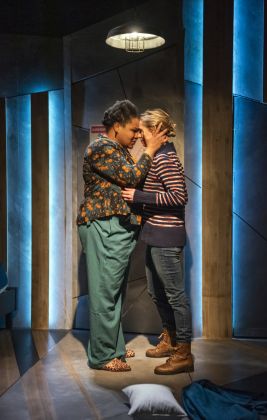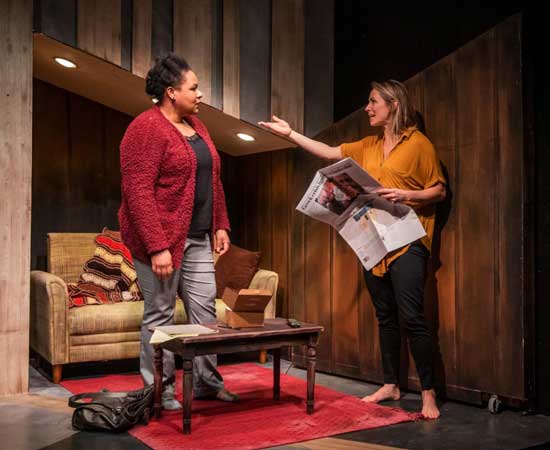

Have you heard the story of the woman who put duty to country and truth above her own happiness? Uh-huh—didn't think so. This is because accounts of extraordinary females are likely to be framed in circumstantial speculation attributing their subject's courageous deeds to the influence of mentorly father-figures or, at the least, maternal impulses rooted in nesting behavior—motives distinct from those of men, whose achievements are more often assumed to be based in matters of principle. Playwright Christina Telesca Gorman permitting her she-ro's actions to arise from righteous conviction represents a rare departure from sexist stereotype, then, as does the domestic tranquility disrupted thereby being that of a comfortably married lesbian couple. Is the Bechdel seal of approval enough, however, to salvage a narrative so ripped-from-the-headlines that we might as well be reading the headlines themselves? Roan @ the Gates begins in the environs of Washington DC, where civil-rights lawyer Natalie recounts the events of her busy day with NSA computer-network security-analyst Roan as they snuggle in bed on the night before the latter is scheduled to depart on another of her hush-hush work assignments. The next episode takes us to an airport in Moscow, where Roan is camped on the floor of a storage closet, her passport having been invalidated following its owner's disclosure to a British journalist of illegal surveillance operations conducted by her employers. Unable to leave without assurance of asylum in a country prepared to defy United States law enforcement, she pleads with her stunned wife—already herself suffering the scrutiny associated with notoriety—to join her under the dubious protection offered by a foreign nation renowned for its homophobia. Playgoers who missed the details of the 2013 Edward Snowdon contretemps need only consult their Wikipedias to detect this scenario's parallels to the still hotly-contested facts of that case. The urgency generated by ( gasp! ) government intrusion upon the privacy of civilians in 2020, when homes, offices and even bodily functions are monitored by anonymous agents, remains undecided, but there is no denying the current interest in "whistle-blower" informants, or the renewed examination of issues regarding interspousal transparency and the limits of whither-thou-goest marital promises. A dialogue orchestrated for only two speaking characters on a stage picture composed of a bedroom and living room—albeit located in different hemispheres—could easily be reduced to a pair of talking heads referencing names and places recalled dimly (if at all), were it not for the immutable connection forged by Brenda Barrie and Jasmine Bracey during every second of the lovers' struggle for a solution to the adversity rendered by scientific advances. Escalating the tension are the technical artists who conjure a labyrinth of unseen spycraft, even to the pre-curtain exhortation to turn off our phones. ("I will know [if you don't]" warns a voice concealed behind a wall.)
